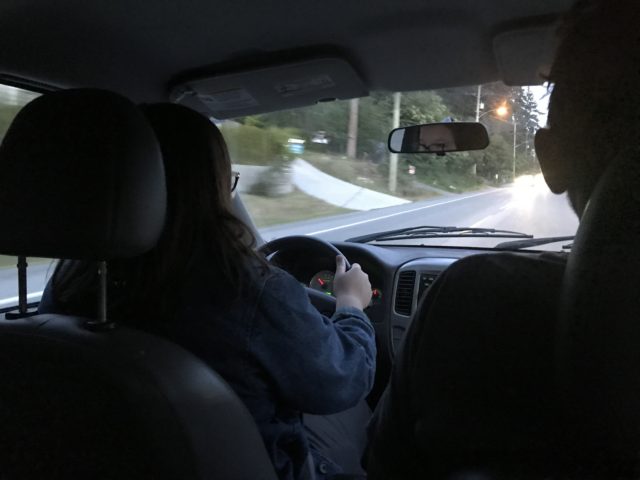At The Beginning

Week 36 (of 38) – May 27 to 31, 2019
My kid turned 16 this week. It’s official… she’s on the road. I had the privilege to drive with her as a passenger in the backseat. This was her third time behind the wheel… and she got her first HONK from the driver behind her. For her Sweet 16, it was a pretty low key birthday and I am grateful. I am so proud of her for getting 98% on the exam, but I was also reminded that she is a beginner driver. YIKES! She was holding that steering wheel pretty tightly at 10 and 2. I think the only one not nervous in the car was the dog.
As much as I appreciated the family walk on the waterfront on my kid’s 16th birthday, I was reminded of “traditional expertise.” She is a beginner driver. A novice. She was nervous driving for the first time on the highway (with her parents in the car). There was a lot of information to consider and you had to perform LIVE. Consequences are REAL. And, quality of her performance was evident. I remember a course I took during my doctorate program and the visiting professor, Dr. David Berliner, said that he would never put his children into a novice teacher’s classroom versus and expert. I can see why.
Did we die in the car? Nope. I’m here writing my weekly blog of reflection. So, we’re good. Was my daughter fluent in her driving skills? Nope. It was somewhat mechanical and robotic. Was it terrible? Nope. Was it great? Nope. Does she have a lot to learn? Yup. Will deliberate practice help? Absolutely. Keep trying. Learn from your mistakes. Listen to experts. Try again. You will get better. She did amazing on the Learner’s Test and I know that she learned the content (in her own way) and practiced demonstrating her knowledge online such that she successfully walked away with her learner’s license.
Thank goodness for my kid. I say that everyday. She makes me a better person, a better teacher, and a better learner. My dissertation talked about “traditional expertise” and how do non-math specialist teachers learn the subject matter of math to teach math. For these out-of-field teachers, when they teach secondary mathematics, there is a high level of vulnerability, a high level of stress, and low to moderate performance. Over time, they can build their expertise and content knowledge with deliberate practice. You have to invest the time and effort to reflect, learn, and get better. Be patient and be kind (to yourself).
It was in my research. It’s the advice I would give my daughter. It’s the advice and words of wisdom I need to give myself. I started thinking about SELF-EFFICACY (one’s belief in one’s ability to produce a desired or intended result). Last week, I realized that I am a doctor!!! I know… I earned my credentials almost 2 years ago and I just believe it… now. Sounds strange, I know. It’s all over my social media feed that I’m “Dr. Christine Younghusband” but I never really internalized that about myself. This was my first year teaching full-time at a university and the first time away from my family. Although I do come to this position with an expertise in teaching secondary mathematics and developing expertise in research, I am new to teaching and leading in higher education.
I am at the beginning. I am grateful for the opportunities I have been afforded at the university. I am happy to have people in my circle who I connect with and can learn from. I love the class I’m teaching online this spring (and it’s my first time teaching this graduate course and teaching online). I love learning with them and extending our expertise with practicing teachers engaged in higher education. It’s been really fun. I am so glad to have this spring session course. My students are awesome. But what I have learned in the last year is know my limitations, my abilities, and my capacity. As my friend would say, I always want to go from novice to expert in one step. Be patient. Be kind.